
Maly Tiev
NP
Location : New York, NY, USA
BIO
Maly Tiev, RN, MSN, ANP-BC is a seasoned Adult Nurse Practitioner with over 25 years of clinical and research experience in hepatology. She currently serves as the Administrative Nurse Practitioner Coordinator at NYU Langone Health, where she leads advanced care for patients with complex liver diseases including MASLD/MASH, PBC, PSC, AIH, viral hepatitis, liver cancer, and pre-liver transplantation.
Maly has held pivotal roles at leading institutions such as Northwell Health and has served as a Medical Science Liaison for Mirum and Intercept Pharmaceuticals supporting clinical research, education, and strategic stakeholder engagement.
A nationally recognized speaker and educator, she has contributed as a sub-investigator to over 70 clinical trials and remains an active voice in liver disease management. Maly frequently speaks at national and regional conferences and has coauthored multiple abstracts presented at AASLD, DDW, and ACG.
Passionate about bridging clinical practice with innovation, she continues to mentor emerging providers and serves on several advisory boards across the hepatology space. Maly earned both her BSN and MSN in Adult Nurse Practitioner from Adelphi University.
MASLD-MASH Content Featuring Maly

Clinical Deep Dive: Unlocking the Treatment Potential of Rezdiffra

This educational discussion dives into Rezdiffra, the first and only FDA-approved therapy for non-cirrhotic metabolic-associated steatohepatitis (MASH) with moderate to advanced fibrosis. The talk provides a clinical deep dive into the progression of MASH and fibrosis, highlighting the risks of untreated disease and the importance of early intervention. A key focus is the thyroid hormone receptor beta mechanism, explaining how Rezdiffra directly targets liver-specific pathways to reduce hepatic fat accumulation and fibrosis. Additionally, the discussion covers the rigorous FDA approval process and dual efficacy endpoints, detailing how Rezdiffra achieved significant fibrosis improvement and steatohepatitis resolution in the MAESTRO-NASH trial. The session also provides practical insights into patient access, prescribing considerations, and managing common side effects. With over 2,000 patients studied, Rezdiffra has demonstrated a strong safety profile and offers a once-daily oral treatment option that represents a major advancement in MASH management. This discussion is essential for gastroenterologists, hepatologists, and endocrinologists managing patients with MASH, as well as primary care providers and cardiologists who play a role in identifying at-risk individuals. If you are a healthcare professional looking to stay updated on the latest MASH research and treatment strategies, this session provides the insights you need.
Watch Now
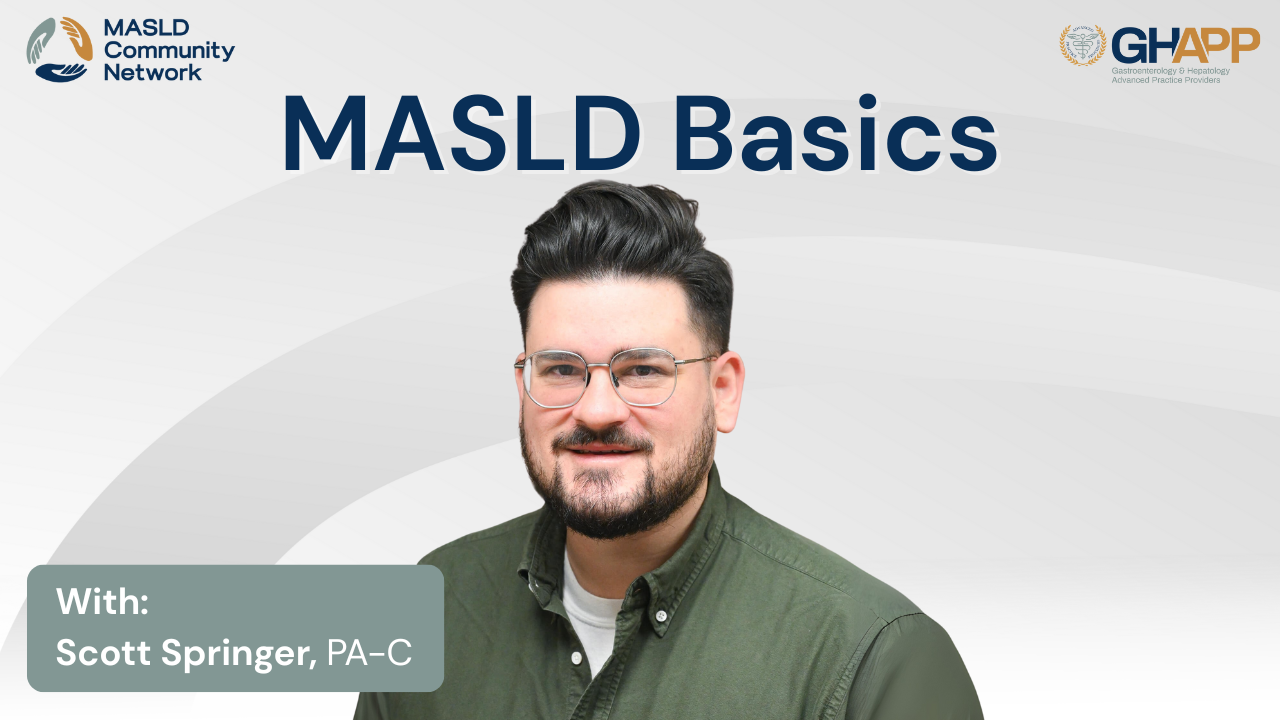
MASLD Basics With Scott Springer

Welcome to the GHAPP MASLD Community Network, where Scott Springer, PA-C, from Erie County Medical Center in Buffalo, NY, provides a comprehensive overview of the evolving landscape of steatotic liver disease. Sponsored by Madrigal Pharmaceuticals, this session breaks down the recent nomenclature shift from NAFLD/NASH to MASLD (Metabolic Dysfunction-Associated Steatotic Liver Disease) and MASH (Metabolic Dysfunction-Associated Steatohepatitis). Scott explores how overlapping etiologies like alcohol-associated liver disease (ALD) and the emerging classification of MetALD better reflect real-world patient populations. Learn about key diagnostic strategies—including the use of FIB-4, ELF score, and transient elastography—to assess fibrosis risk and guide referral to hepatology care. With a clinical case study, Scott highlights the importance of accurate staging, ruling out alternative etiologies, and understanding progression rates in high-risk patients. This session is a must-watch for GI and hepatology APPs looking to stay updated on guidelines, non-invasive diagnostics, and best practices for managing MASLD/MASH in primary and specialty settings.
Watch Now

Lifestyle Management With Milly Ng

Join Milly Ng, NP, a hepatology nurse practitioner at Tufts Medical Center in Boston, for an evidence-based session on lifestyle management for MASLD and MASH, presented through the GHAPP MASLD Community Network and sponsored by Madrigal Pharmaceuticals. Through the case of "Albert," a patient with steatosis and metabolic risk factors, Milly highlights the importance of personalized counseling and non-invasive testing like FIB-4 and FibroScan to assess fibrosis risk. She reviews how Metabolic Dysfunction-Associated Steatotic Liver Disease (MASLD) and its progressive form, MASH, can be reversed through diet, exercise, and weight loss, particularly before fibrosis advances to cirrhosis. Learn how to tailor dietary guidance to a patient's cultural background, socioeconomic status, and personal goals, and understand how central obesity and insulin resistance drive disease progression. Milly also reviews the genetic and environmental factors influencing steatosis, why aerobic training may be more effective than resistance workouts for liver health, and how validated tools like the EDAS (Exercise and Diet Adherence Scale) can track patient progress. This session empowers primary care and hepatology providers to deliver patient-centered lifestyle interventions that can prevent liver disease progression and reduce cardiometabolic risk.
Watch Now
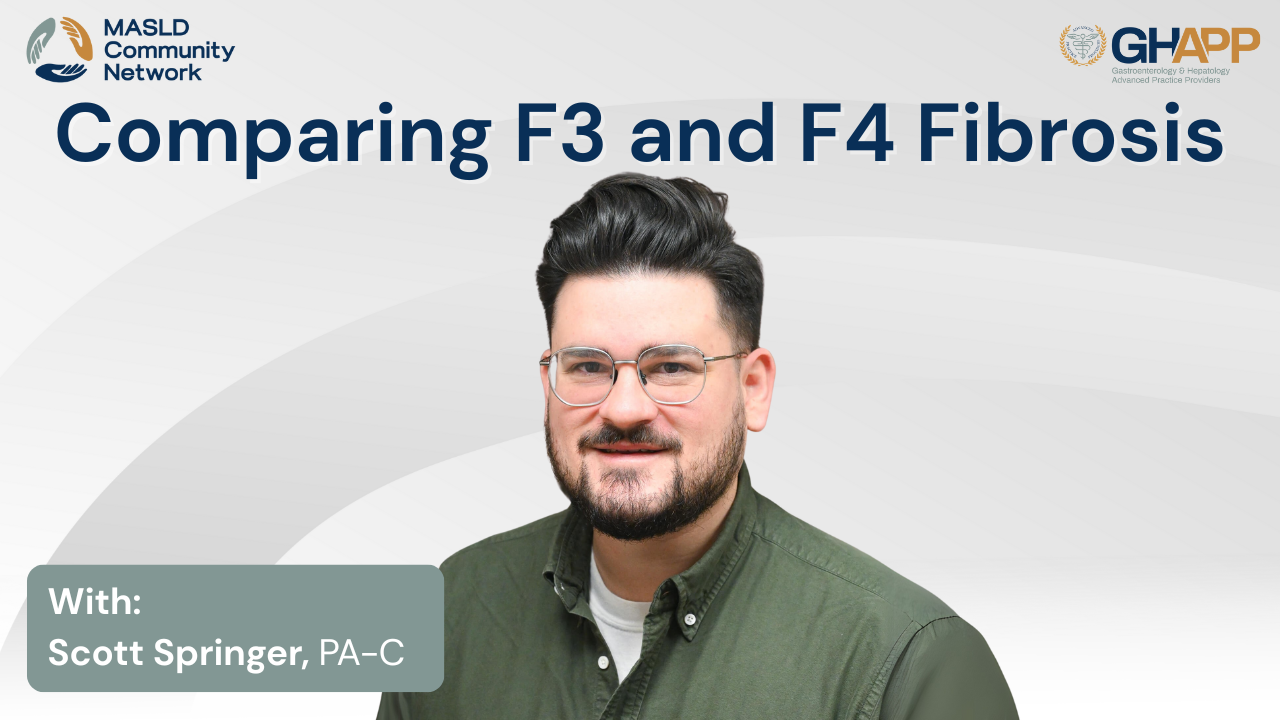
Comparing F3 and F4 Fibrosis With Scott Springer

Join Scott Springer, PA-C, from Erie County Medical Center in Buffalo, NY, for a case-based clinical discussion on how to evaluate and manage F3 vs. F4 fibrosis in patients with Metabolic Dysfunction-Associated Steatotic Liver Disease (MASLD) and MASH, presented through the GHAPP MASLD/MASH Community Network and sponsored by Madrigal Pharmaceuticals. Using a detailed side-by-side comparison of a fictional patient "Sam," Scott demonstrates how to interpret key non-invasive testing modalities—including FIB-4, ELF, and FibroScan—to stage liver fibrosis, determine candidacy for emerging therapies like resmetirom (Rezdiffra), and identify when liver biopsy may still be necessary. Learn how changes in platelet count, ELF score, and liver stiffness (kPa) help distinguish advanced fibrosis (F3) from cirrhosis (F4) and how this affects treatment decisions, HCC surveillance, and portal hypertension management. Scott also emphasizes the role of GLP-1 therapy, aggressive cardiometabolic risk reduction, and lifestyle counseling as core strategies in MASLD care. This session is a practical guide for GI and hepatology providers navigating MASLD staging, treatment eligibility, and long-term monitoring in 2025 and beyond.
Watch Now
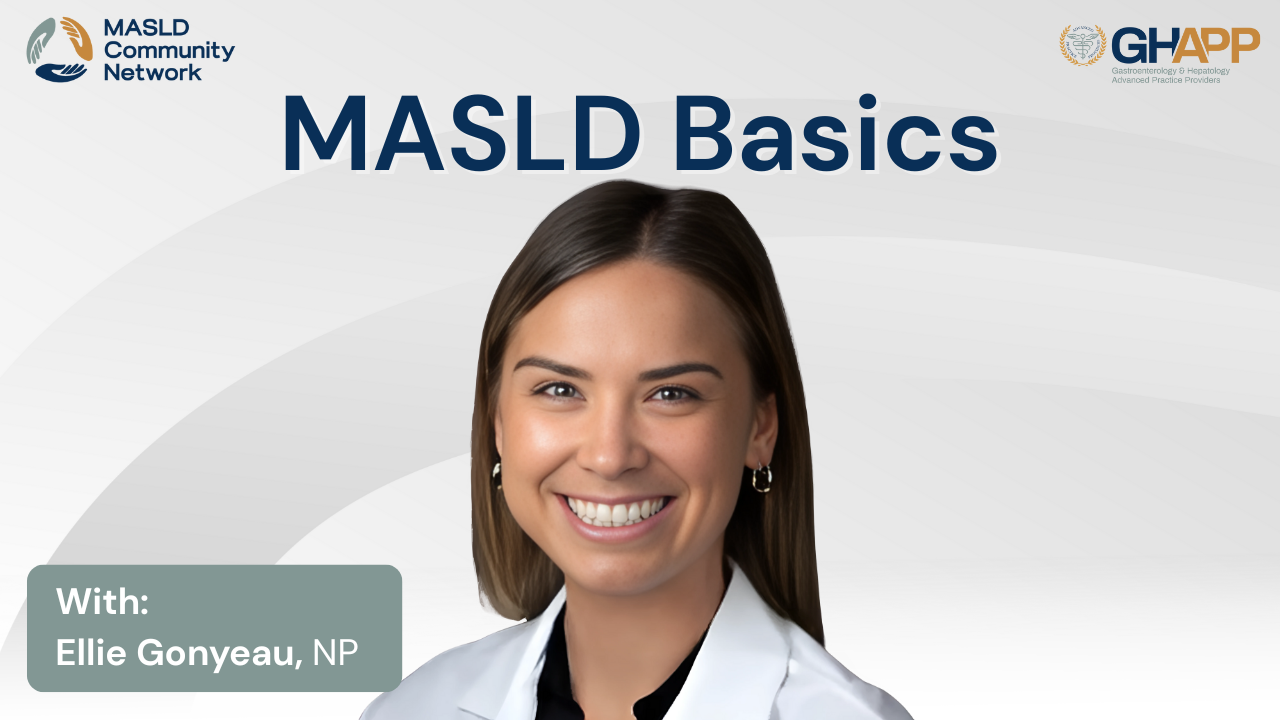
MASLD Basics With Ellie Gonyeau

Join Ellie Gonyeau, NP, a GI and hepatology nurse practitioner at Beth Israel Deaconess Medical Center in Boston, for a foundational overview of Metabolic Dysfunction-Associated Steatotic Liver Disease (MASLD), formerly known as NAFLD. Presented through the GHAPP MASLD Community Network and sponsored by Madrigal Pharmaceuticals, this session covers the latest updates in MASLD nomenclature, diagnostic criteria, and non-invasive evaluation strategies. Ellie walks through the 2023 guidelines, emphasizing how MASLD is defined by hepatic steatosis in the presence of at least one metabolic risk factor—such as obesity, type 2 diabetes, hypertension, or dyslipidemia—and the importance of ruling out excessive alcohol use and other causes of chronic liver disease. Using real-world case examples like "JP", Ellie illustrates how to assess disease severity using tools such as FIB-4, FibroScan, and lab workups, while explaining when to consider specialty referral, further imaging, or liver biopsy. The talk also highlights the alarming rates of MASLD in high-risk populations, such as the Latin American community, and explores the disease's potential to silently progress to MASH, fibrosis, or cirrhosis. Whether you're in primary care, GI, or hepatology, this session provides critical insights on early detection, risk stratification, and guideline-based management of this increasingly prevalent condition.
Watch Now
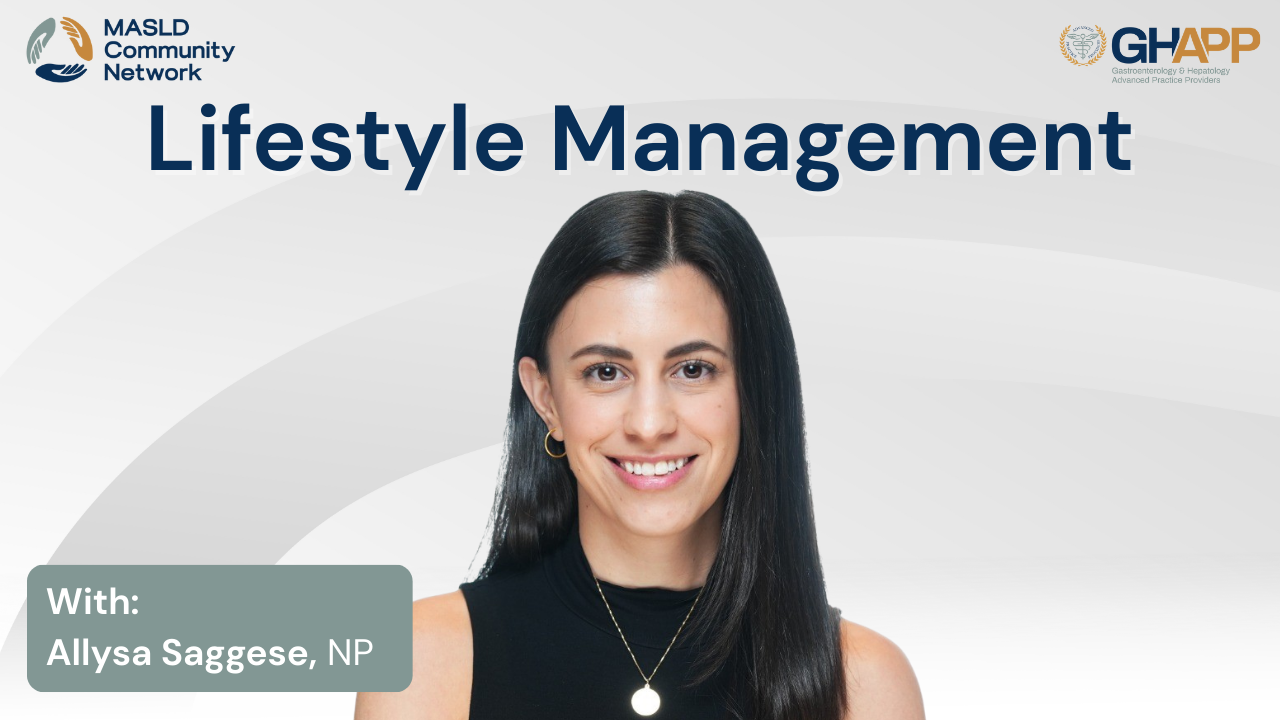
Lifestyle Management With Allysa Saggese

Join Allysa Saggese, NP, from Weill Cornell Medicine in New York City, for an insightful and practical discussion on lifestyle management for MASLD and MASH, presented through the GHAPP MASLD/MASH Community Network, sponsored by Madrigal Pharmaceuticals. In this case-based presentation, Allysa walks viewers through the non-pharmacologic strategies used to manage Metabolic Dysfunction-Associated Steatotic Liver Disease (MASLD), highlighting the role of nutrition, physical activity, and patient-centered counseling. Using a real-world example of a 65-year-old patient with obesity, diabetes, and steatosis, Allysa demonstrates how to assess fibrosis risk through non-invasive testing like FIB-4 and FibroScan, and explains how lifestyle modifications remain central to slowing disease progression—even in the era of advanced therapeutics. The session explores the importance of motivational interviewing, cultural dietary preferences, and how to structure effective, individualized conversations around reducing sugar intake, increasing movement at home, and achieving sustainable 5–10% weight loss to improve liver histology. Allysa also breaks down the metabolic interplay between central adiposity, insulin resistance, and liver inflammation, and shares counseling tips to build patient trust and long-term engagement. Whether you're a GI or hepatology provider, this session delivers real-world guidance to help empower patients to reverse early liver damage through everyday lifestyle changes.
Watch Now

Management of Life Style Modification

This video focuses on the comprehensive management of patients with metabolic-associated steatohepatitis (MASH), emphasizing lifestyle modifications, dietary adjustments, and exercise strategies. Key topics include the importance of addressing risk factors like diet, exercise habits, and alcohol intake, as well as referrals to medically supervised weight loss clinics or bariatric surgery for advanced cases. The speaker highlights the benefits of the Mediterranean diet, intermittent fasting, and avoiding ultra-processed foods while discussing the role of resistance training to combat sarcopenia and maintain muscle mass. Practical advice and tailored recommendations ensure a holistic approach to managing MASH and improving patient outcomes.
Watch Now

Third Step of Life Style Management

This video provides a comprehensive overview of emerging pharmacologic treatments for metabolic-associated steatohepatitis (MASH) and their tailored applications based on patient profiles. Topics include FDA-approved therapies, drugs in advanced clinical trials (such as semaglutide and lanifibranor), and the potential for combination treatments targeting both steatohepatitis and fibrosis. The speaker emphasizes the importance of patient-specific approaches considering metabolic profiles, obesity, and diabetes status, alongside lifestyle interventions. Additionally, the video discusses the evolving interdisciplinary care model and highlights the exciting progress in non-invasive testing and treatment advancements for F2-F3 fibrosis.
Watch Now

Approved Medication for MASH/NASH

This video provides detailed guidance on selecting and monitoring patients for emerging therapies targeting advanced fibrosis (F2-F3) in NASH. Key topics include contraindications for patients with cirrhosis, considerations for concomitant medications, and dose adjustments for statins. The video outlines ideal candidates based on specific thresholds for VCTE, MRE, ELF scores, and other non-invasive tests while emphasizing the importance of ruling out portal hypertension and other liver diseases. It also reviews a stepwise monitoring approach, focusing on tolerability at three months and efficacy assessments at six and twelve months, with an emphasis on histologic and non-invasive test improvements.
Watch Now

Types of Diet for the Treatment of MASLD

This video explores comprehensive strategies for managing metabolic-associated steatohepatitis (MASH), focusing on fibrosis risk stratification, lifestyle modifications, and pharmacologic interventions. Learn about dietary recommendations like the Mediterranean diet, exercise guidelines emphasizing resistance training, and the role of intermittent fasting and processed food avoidance. The video also highlights weight loss targets, diabetes management, and emerging therapies such as GLP-1 receptor agonists and bariatric surgery, all aimed at improving liver health and patient outcomes.
Watch Now

NITs to Identify High Risk MASH Patients

Explore advancements in non-invasive diagnostics and risk stratification for liver fibrosis and MASH. This video highlights tools like FIB-4, transient elastography, and innovative scoring systems (e.g., FAST and Agile) to identify and predict outcomes for high-risk patients. Learn about serum biomarkers, updated guidelines, and the role of lifestyle interventions alongside targeted therapies for managing metabolic risks and advancing care in hepatology.
Watch Now
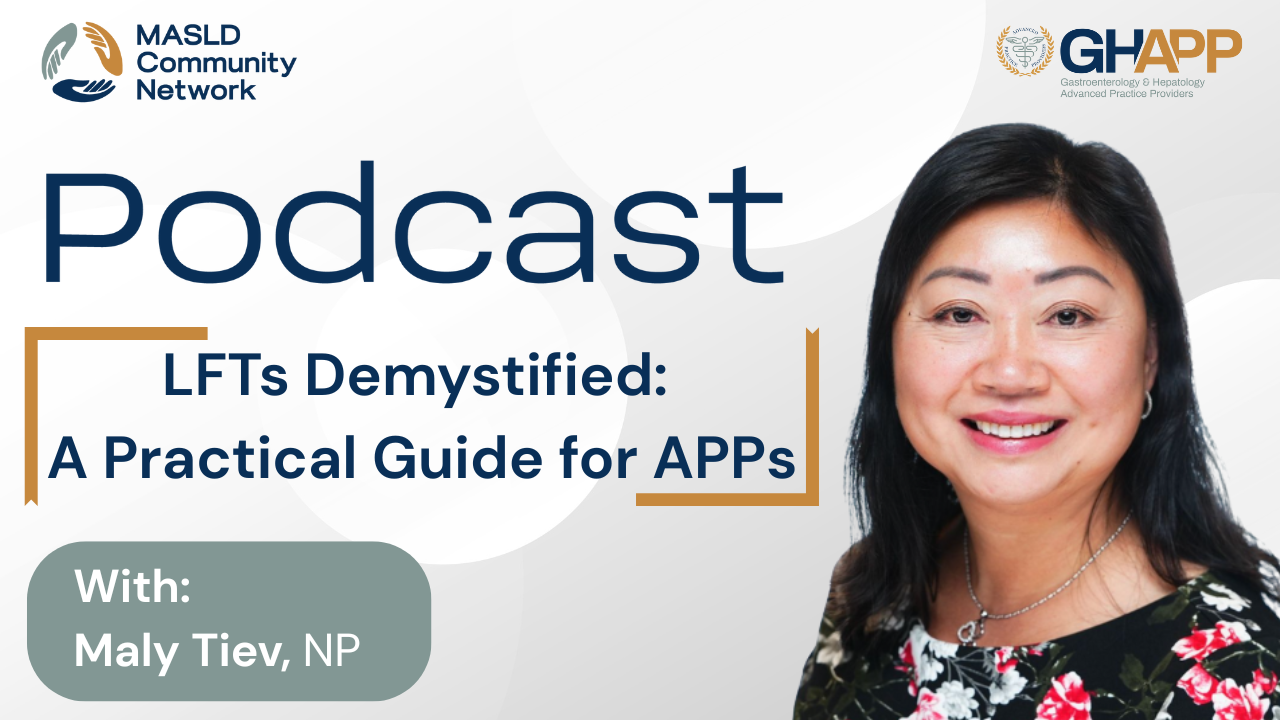
LFTs Demystified: A Practical Guide for APPs

Join Maly Tiev, NP at NYU Langone Health, for this essential educational session on demystifying liver function tests (LFTs), brought to you by the GHAPP MASLD Community Network. In this video, Maly explains how to interpret ALT, AST, alkaline phosphatase, GGT, bilirubin, albumin, INR, and platelet counts in the context of MASLD (Metabolic Dysfunction-Associated Steatotic Liver Disease) and MASH (Metabolic Steatohepatitis). Learn why elevated liver enzymes are not always present in MASH, how to distinguish between different causes of abnormal LFTs—including alcohol-related liver disease, viral hepatitis, and drug-induced liver injury—and how serial LFT monitoring can indicate treatment response or disease progression. Discover the importance of using non-invasive tools for fibrosis risk stratification, the role of platelets as a key marker, and how a deeper understanding of synthetic function tests can help identify cirrhosis earlier. Whether you're a clinician or a patient looking to understand the lab work behind fatty liver disease, this presentation offers practical insights for interpreting LFTs with confidence.
Watch Now

Differentiating Between F3 and F4

In this comprehensive discussion, HoChong Gilles, a nurse practitioner with 25 years of hepatology experience at the Richmond VA Medical Center, explores the critical importance of accurately distinguishing between F3 (advanced fibrosis) and F4 (cirrhosis) in patients with MASH (metabolic-associated steatohepatitis). While both stages carry increased risks of liver-specific and overall mortality, Gilles explains that F3 may still be reversible with lifestyle changes or pharmacotherapy, whereas F4 signals irreversible liver damage with heightened risk of complications like portal hypertension, hepatic encephalopathy, and liver cancer. Viewers will gain a deeper understanding of how non-invasive tests—like FIB-4, ELF, FibroScan, and MRE—perform in identifying fibrosis stage, including their limitations and overlaps. Gilles also outlines when to consider liver biopsy, especially in cases with discordant test results, atypical features, or clinical uncertainty. This video emphasizes how staging accuracy informs eligibility for therapies, surveillance strategies like HCC screening, and overall prognosis. Learn how to approach this nuanced distinction in clinical practice and why F3 vs. F4 isn't just semantics—it's a turning point in patient care.
Watch Now

Addressing Health Disparities: Equity Considerations in MASH/MASLD Care

In this episode, Patrick Horne, NP at the University of Florida (UF Health), explores the impact of health disparities and socioeconomic inequality on the diagnosis and management of MASH (metabolic-associated steatohepatitis) and MASLD (metabolic dysfunction-associated steatotic liver disease). With a focus on rural and underserved populations, Patrick discusses how limited access to quality healthcare, healthy food, exercise options, and non-invasive testing (NITs) like FibroScan or MRI elastography can delay diagnosis and worsen outcomes. He shares practical, empathetic strategies for individualizing care, such as using accessible tools like FIB-4 or APRI, promoting low-cost physical activity like walking or swimming, and providing culturally sensitive nutrition advice tailored to financial and geographic realities. Patrick emphasizes the provider’s role as a patient advocate and coach, helping patients navigate barriers and create sustainable lifestyle modifications. This episode offers key insights for clinicians working to close gaps in care and promote equity in liver disease management.
Watch Now

Pharmacotherapy Review

Join Christina Hanson, FNP-C, from South Denver Gastroenterology, as she provides an in-depth overview of the current pharmacologic treatment landscape for Metabolic Dysfunction-Associated Steatotic Liver Disease (MASLD) and Metabolic Dysfunction-Associated Steatohepatitis (MASH). This expert-led session explores the three cornerstones of MASH management—lifestyle and weight loss interventions, cardiovascular risk reduction, and liver-directed therapy—while highlighting the evolving role of GLP-1 receptor agonists and the recent FDA approval of resmetirom, the first medication indicated for adults with MASH and moderate to advanced fibrosis. Christina also discusses clinical trial data from MAESTRO-NASH, reviews historical agents like vitamin E and pioglitazone, and offers practical guidance on patient selection, safety considerations, and monitoring strategies. Whether you’re a GI provider, hepatology specialist, or primary care clinician managing fatty liver disease, this video provides valuable insights into how emerging therapies are shaping the future of MASH treatment.
Watch Now

Liver Model Overview

Join Alison Moe, PA-C with United Digestive, as she walks through a hands-on demonstration using a life-sized liver model to help patients better understand fibrosis and liver disease progression. In this engaging and practical overview, Allison explains how different stages of liver fibrosis—from normal liver to cirrhosis and hepatocellular carcinoma—can be felt and visualized using a segmented anatomical model. She shares how this tool enhances patient education during discussions about non-invasive liver testing, such as FibroScan, CAP scores, FIB-4, ELF testing, and more. Designed to support visual learners and improve comprehension of disease state, this video is a valuable resource for clinicians and patients navigating the complexities of metabolic-associated fatty liver disease (MASLD) and its progression to MASH. Learn how tactile and visual teaching aids can bridge the gap between diagnostics and patient understanding in hepatology care.
Watch Now
Highlighted Events

GHAPP Eighth Annual Conference

About the 2025 GHAPP Conference The GHAPP conference is the only conference specifically designed by advanced practice providers (APPs) for the pur..
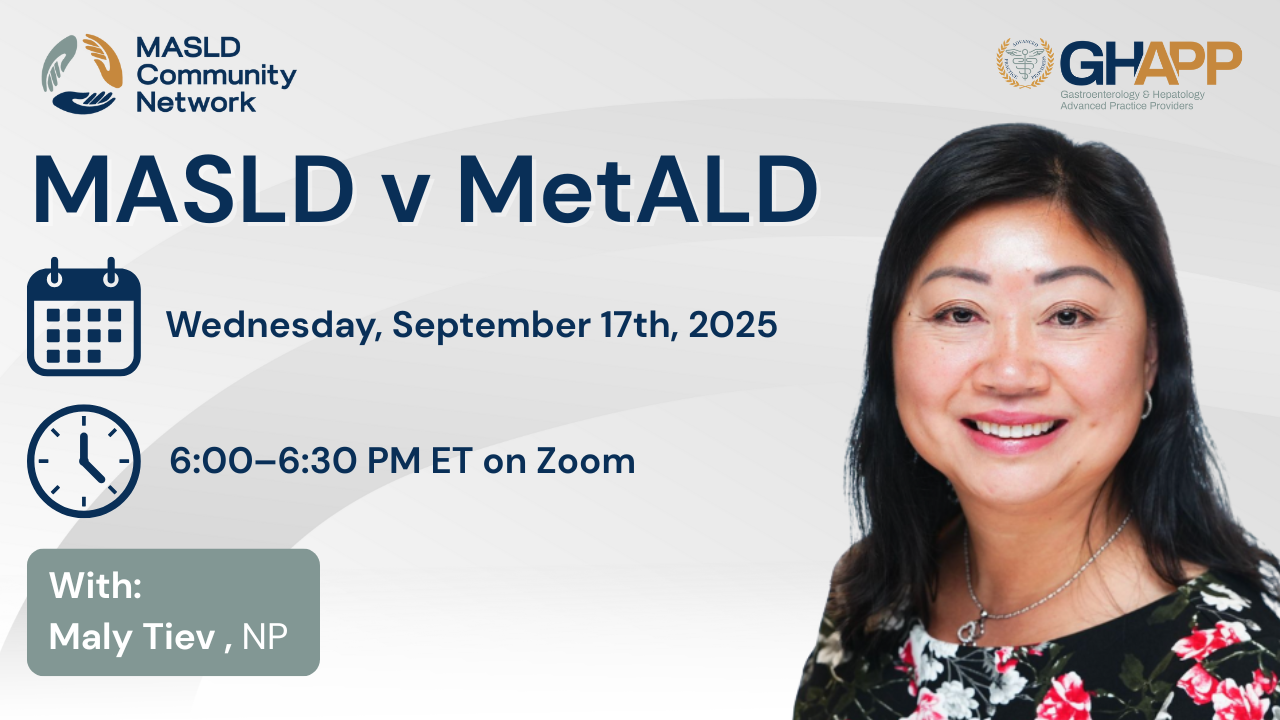
MASLD vs MetALD - Virtual

Join Maly Tiev, NP, on September 17, 2025, for a live GHAPP Zoom session focused on MASLD vs MetALD. ..
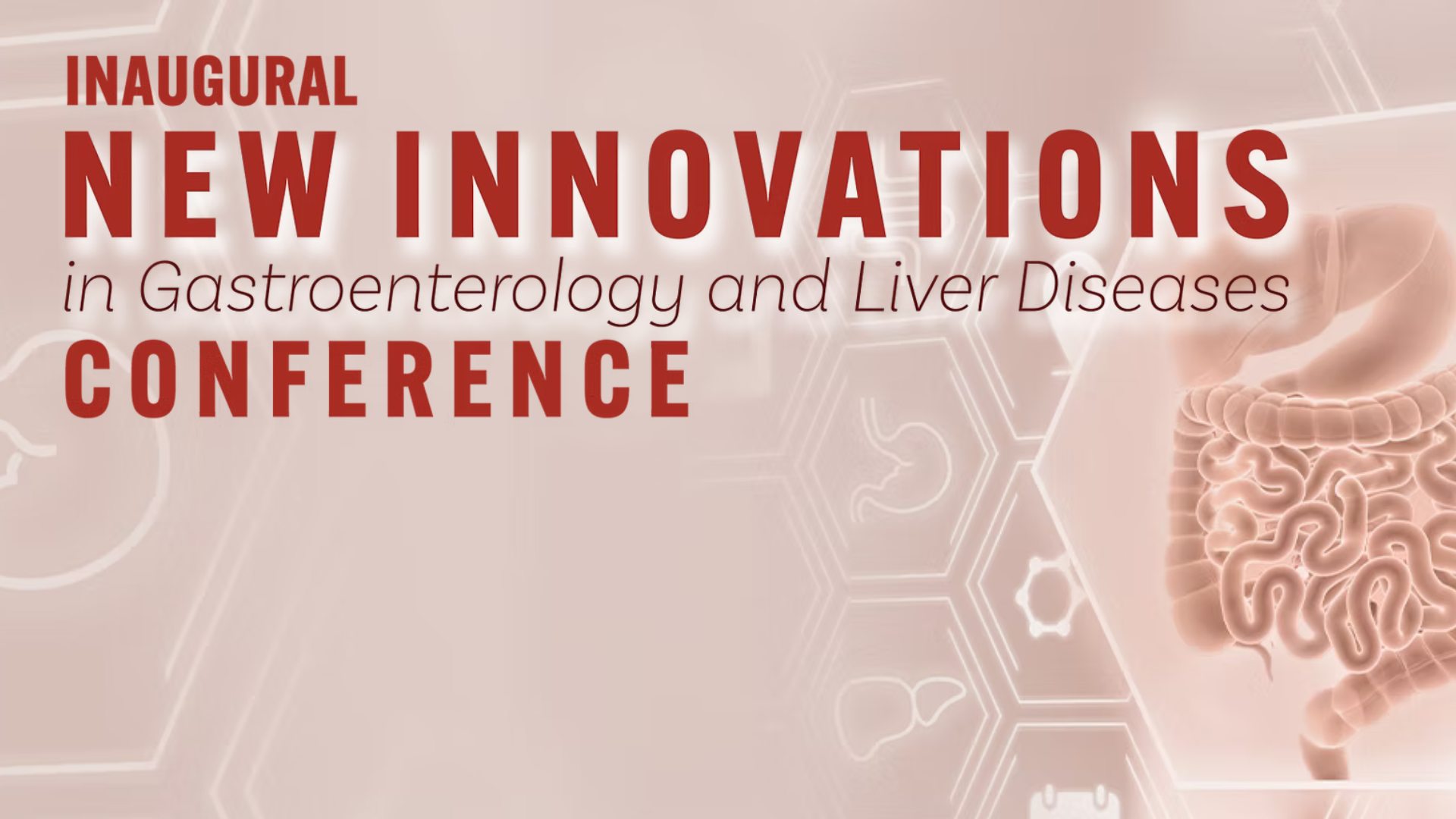
New Innovations in Gastroenterology and Liver Disease 2025 Conference

This conference will give participants a comprehensive outlook on cutting-edge developments in diagnosing, treating, and preventing digestive and live..
Related Content

Clinical Deep Dive: Unlocking the Treatment Potential of Rezdiffra

This educational discussion dives into Rezdiffra, the first and only FDA-approved therapy for non-cirrhotic metabolic-associated steatohepatitis (MASH) with moderate to advanced fibrosis. The talk provides a clinical deep dive into the progression of MASH and fibrosis, highlighting the risks of untreated disease and the importance of early intervention. A key focus is the thyroid hormone receptor beta mechanism, explaining how Rezdiffra directly targets liver-specific pathways to reduce hepatic fat accumulation and fibrosis. Additionally, the discussion covers the rigorous FDA approval process and dual efficacy endpoints, detailing how Rezdiffra achieved significant fibrosis improvement and steatohepatitis resolution in the MAESTRO-NASH trial. The session also provides practical insights into patient access, prescribing considerations, and managing common side effects. With over 2,000 patients studied, Rezdiffra has demonstrated a strong safety profile and offers a once-daily oral treatment option that represents a major advancement in MASH management. This discussion is essential for gastroenterologists, hepatologists, and endocrinologists managing patients with MASH, as well as primary care providers and cardiologists who play a role in identifying at-risk individuals. If you are a healthcare professional looking to stay updated on the latest MASH research and treatment strategies, this session provides the insights you need.
Watch Now
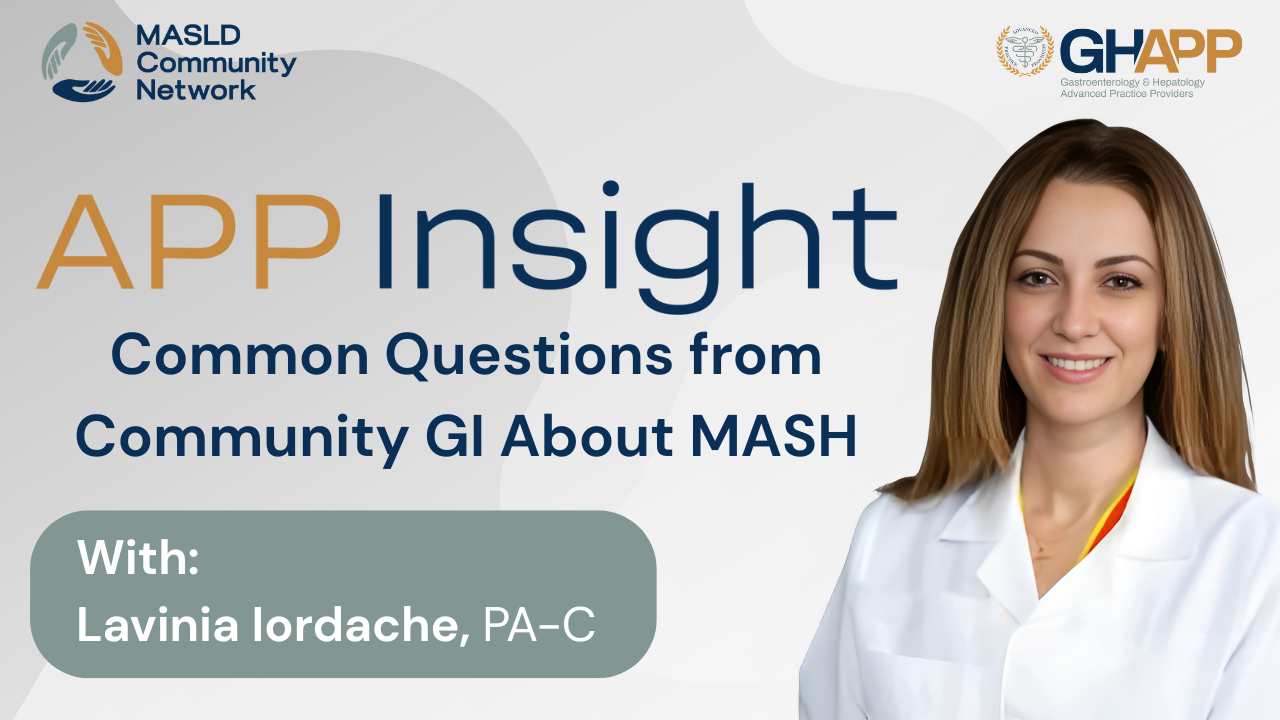
Common Questions From Community GI About MASH

In this insightful session, Lavinia Iordache, PA-C—a seasoned hepatology specialist from the University of Miami—answers critical questions from GI providers about the real-world management of patients with suspected advanced fibrosis. With over a decade of experience in both outpatient and inpatient liver care, Lavinia explores when and how to monitor patients with low-risk FIB-4 scores, the evolving role of liver biopsy, and criteria for hepatology referral. She also breaks down current AASLD and EASL recommendations for imaging surveillance in MASLD and MASH patients, particularly the limitations of ultrasound in obese populations and why CT or MRI may be preferred in high-risk individuals. From noninvasive testing timelines to HCC screening strategies, this episode offers clear, practical guidance to support frontline GI providers managing the growing population of MASLD patients.
Watch Now
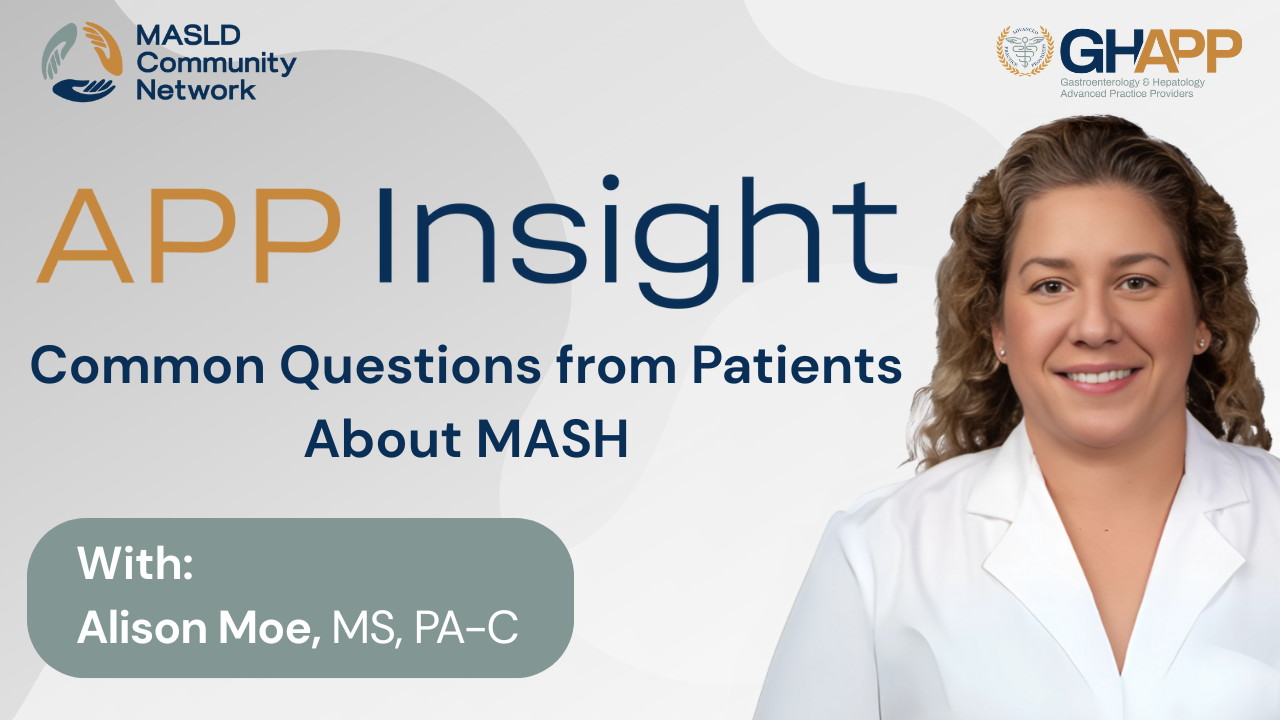
Common Questions From Patients About MASH

In this engaging episode from the GHAPP MASLD Community Network, Alison Moe shares practical insights into the most common questions patients ask about advanced fibrosis and fatty liver disease. Using a liver model, she explains the stages from normal liver to steatosis, fibrosis, and cirrhosis, emphasizing that with lifestyle modifications—such as weight loss, glycemic control, and now FDA-approved pharmacotherapy—fatty liver disease, including F3 fibrosis, can be reversible. Alison also addresses a critical concern: alcohol consumption. She breaks down how her guidance differs depending on the presence and stage of fibrosis, adhering to strict AASLD guidelines to protect liver health. Whether you're a healthcare provider or a patient looking for clarity, this video offers evidence-based guidance and compassionate answers.
Watch Now
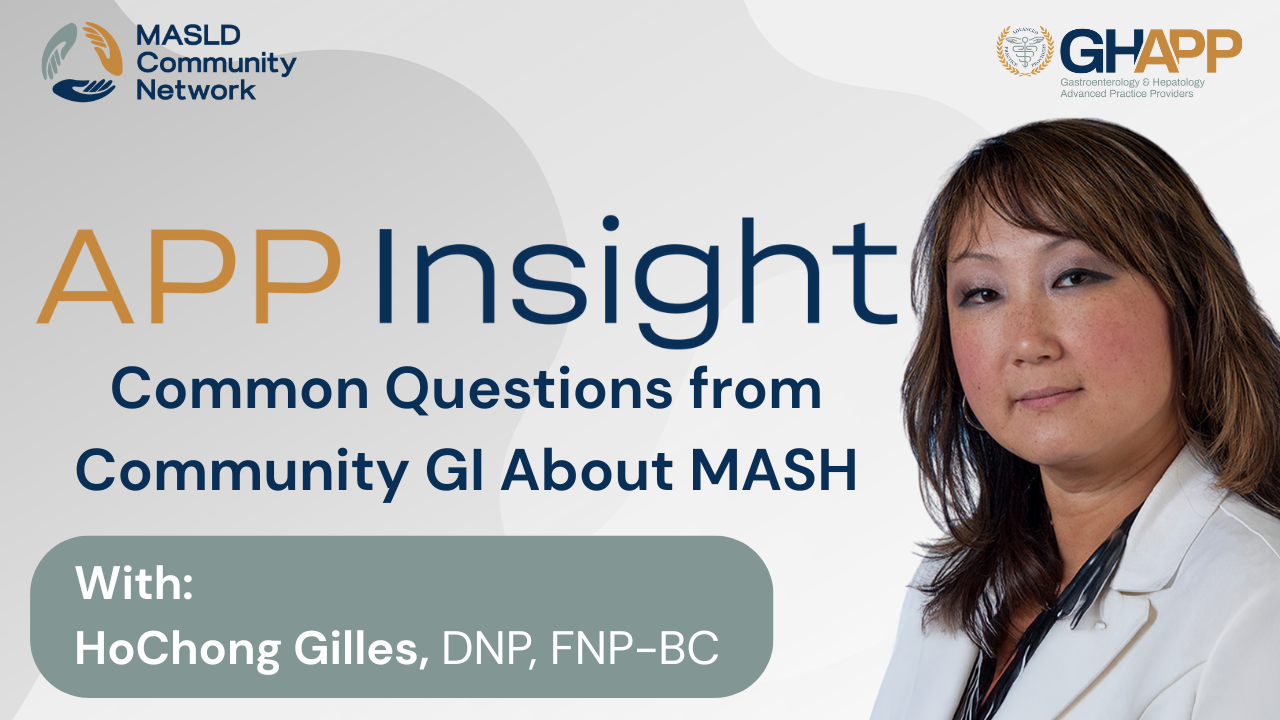
Common Questions From Community GI About MASH

In this educational video, HoChong Gilles, NP—Clinical Program Director at the Central Virginia VA Healthcare System—breaks down practical, non-invasive strategies for evaluating liver fibrosis in community GI and primary care settings. With over 25 years of hepatology experience, she walks through the importance of calculating the FIB-4 score using just four parameters: age, ALT, AST, and platelet count. Learn how to interpret FIB-4 score cutoffs to determine low, indeterminate, or high risk of advanced fibrosis and explore alternative tools like the ELF (Enhanced Liver Fibrosis) test when imaging options are limited. Whether you're a hepatology specialist or a frontline provider, this video offers actionable insights to help bridge the gap in liver care access using guideline-supported lab-based methods.
Watch Now
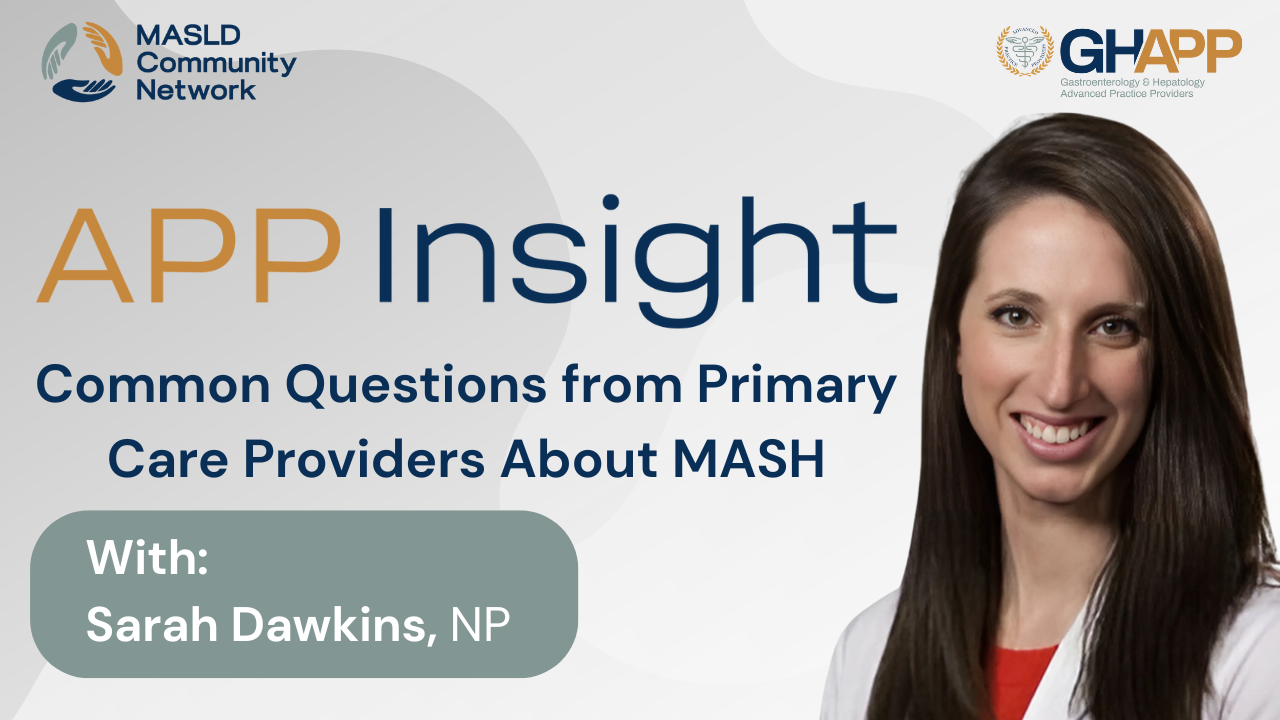
Common Questions From Primary Care Providers About MASH

Join Sarah Dawkins, NP, for quick and practical insights in this edition of GHAPP MASLD Community Network’s APP Insights. Sarah answers common questions from primary care providers about managing patients with hepatic steatosis on imaging but normal liver tests. She explains when to calculate a FIB-4 score, how to interpret mild ALT/AST abnormalities, and when referral to hepatology is necessary. Learn how to assess risk in patients with diabetes, obesity, or metabolic syndrome, and how to rule out other causes like viral hepatitis, alcohol use, drug-induced liver injury, and iron overload. Sarah emphasizes the importance of lifestyle counseling for low-risk patients and provides a clear framework for primary care providers to confidently monitor and manage MASLD without unnecessary referrals. A must-watch for anyone navigating the "gray zone" of liver diagnostics in everyday practice.
Watch Now
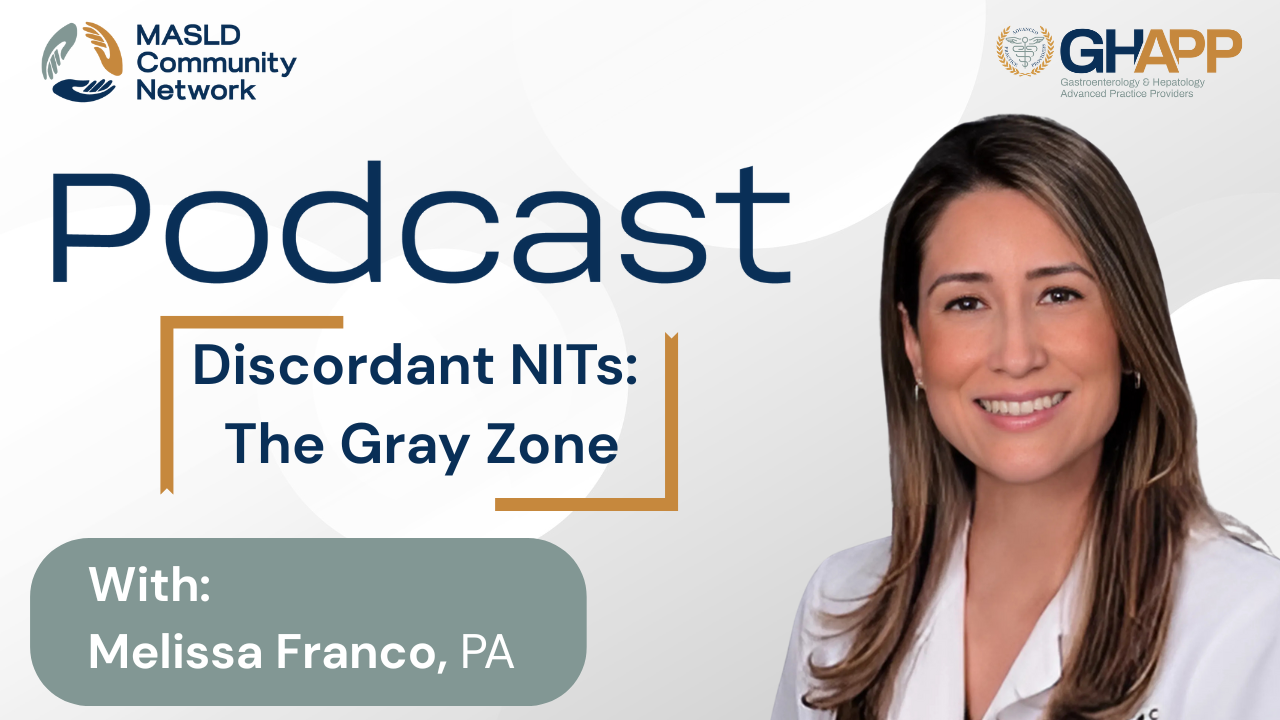
Discordant NITs: The Gray Zone

Join Melissa Franco, PA at the University of Miami, for an in-depth episode of the GHAPP MASLD Community Network podcast focused on discordant non-invasive tests (NITs) and navigating the "gray zone" of liver fibrosis staging. Melissa walks through common real-world scenarios where FIB-4, FibroScan, ultrasound, ELF score, and MR elastography deliver conflicting results—exploring why this happens and how to approach it clinically. Learn how patient factors such as obesity, alcohol use, co-morbidities, medications, and test limitations can impact NIT interpretation. Discover Melissa’s expert strategies for re-evaluating results, when to consider liver biopsy, and how to communicate these complexities with patients. From understanding how false elevations occur to using imaging and labs to confirm or exclude advanced fibrosis, this episode provides a practical and evidence-based approach to staging MASLD and MASH when results don’t align. Whether you're managing metabolic liver disease in hepatology or primary care, this is essential listening for interpreting liver diagnostics in nuanced clinical settings.
Watch Now
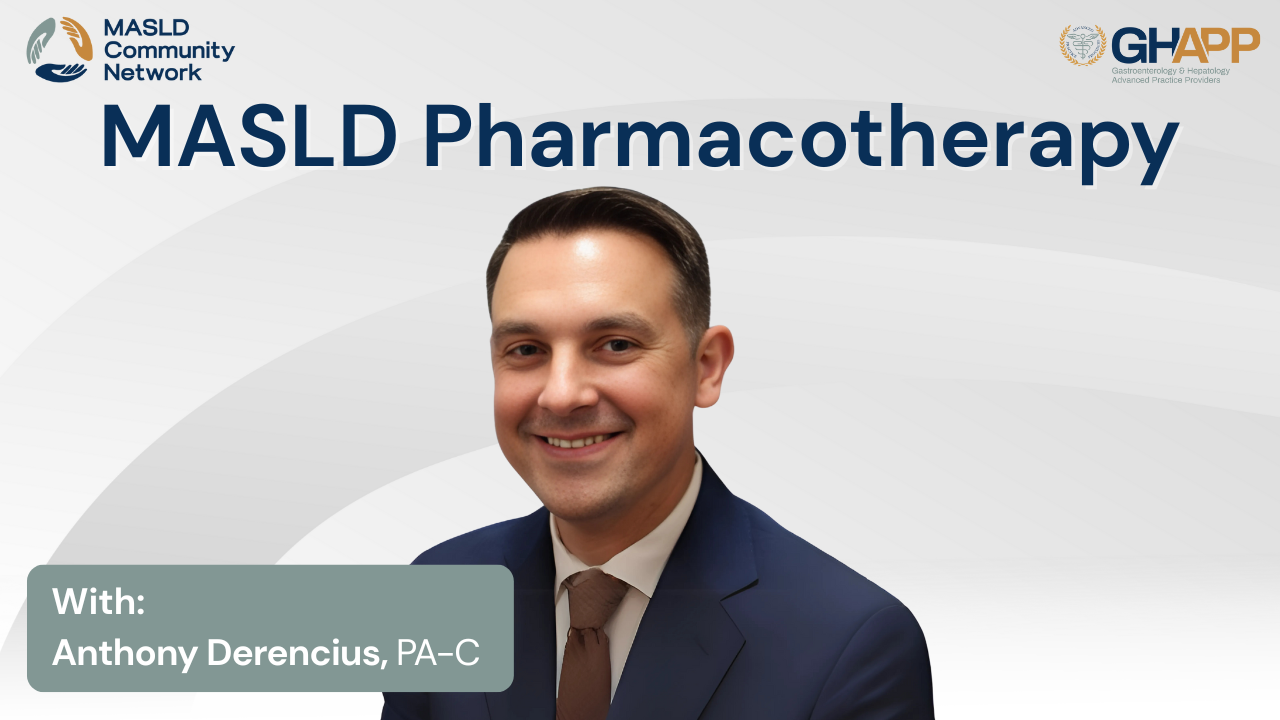
MASLD Pharmacotherapy With Anthony Derencius

Join Anthony Derencius, PA-C, sub-investigator at Pinnacle Clinical Research, for an in-depth, case-based discussion on the pharmacologic management of MASLD (Metabolic Dysfunction-Associated Steatotic Liver Disease) and MASH (Metabolic Steatohepatitis) in this GHAPP MASLD Community Network presentation. With clinical insights from both hepatology practice and research, Anthony explores the multifactorial approach to managing metabolic liver disease—emphasizing weight loss strategies, GLP-1 receptor agonists, cardiovascular risk reduction, and liver-directed therapies. Learn how medications like semaglutide and tirzepatide play a role in weight loss and glycemic control, and how vitamin E and pioglitazone are still considered under specific circumstances. A major highlight includes the mechanism and clinical data behind resmetirom, the first FDA-approved therapy for MASH with F2–F3 fibrosis. Anthony explains its thyroid hormone receptor β-selectivity, efficacy data from the MAESTRO-NASH trial, real-world safety considerations, drug interactions, and monitoring protocols. This presentation is essential viewing for clinicians managing MASLD and MASH in both community and research settings, offering practical strategies, current guidelines, and a look into the future of liver-specific pharmacotherapy.
Watch Now
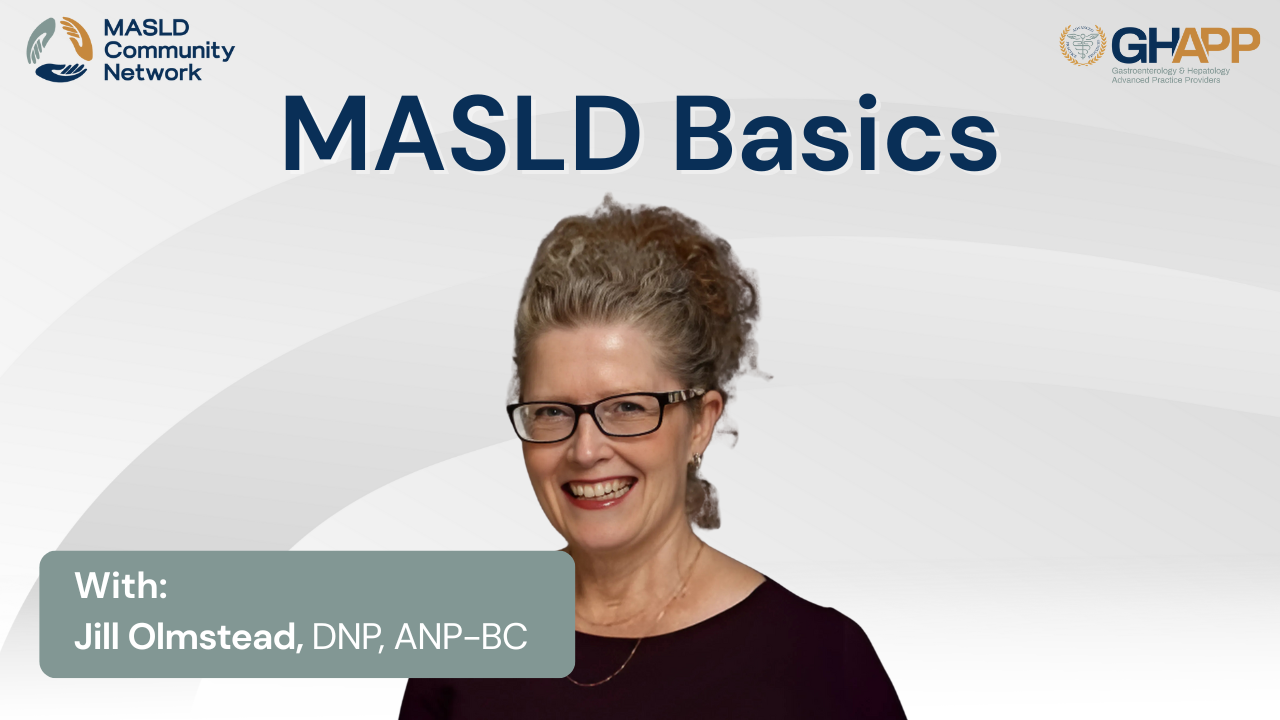
MASLD Basics With Jill Olmstead

Join Jill Olmstead, NP, a seasoned gastroenterology nurse practitioner from Providence St. Joseph Health, for an in-depth overview of MASLD (Metabolic Dysfunction-Associated Steatotic Liver Disease) and MASH (Metabolic Steatohepatitis) in this GHAPP MASLD Community Network presentation, proudly sponsored by Madrigal Pharmaceuticals. With over 20 years of clinical experience, Jill explains the evolving nomenclature from NAFLD/NASH to MASLD/MASH and how this impacts diagnostic criteria, patient communication, and multidisciplinary management. Learn how to identify steatotic liver disease, assess cardiometabolic risk factors, and use tools like FIB-4 and FibroScan to evaluate fibrosis and stratify risk. Jill walks through real-world case scenarios, highlighting when to order a liver biopsy, when to refer to hepatology, and how to apply AASLD guidelines in clinical practice. From evaluating elevated liver enzymes to addressing the global burden of MASLD and its progression to cirrhosis and HCC, this session is essential for providers navigating the complexities of modern liver disease management in both primary care and specialty settings.
Watch Now
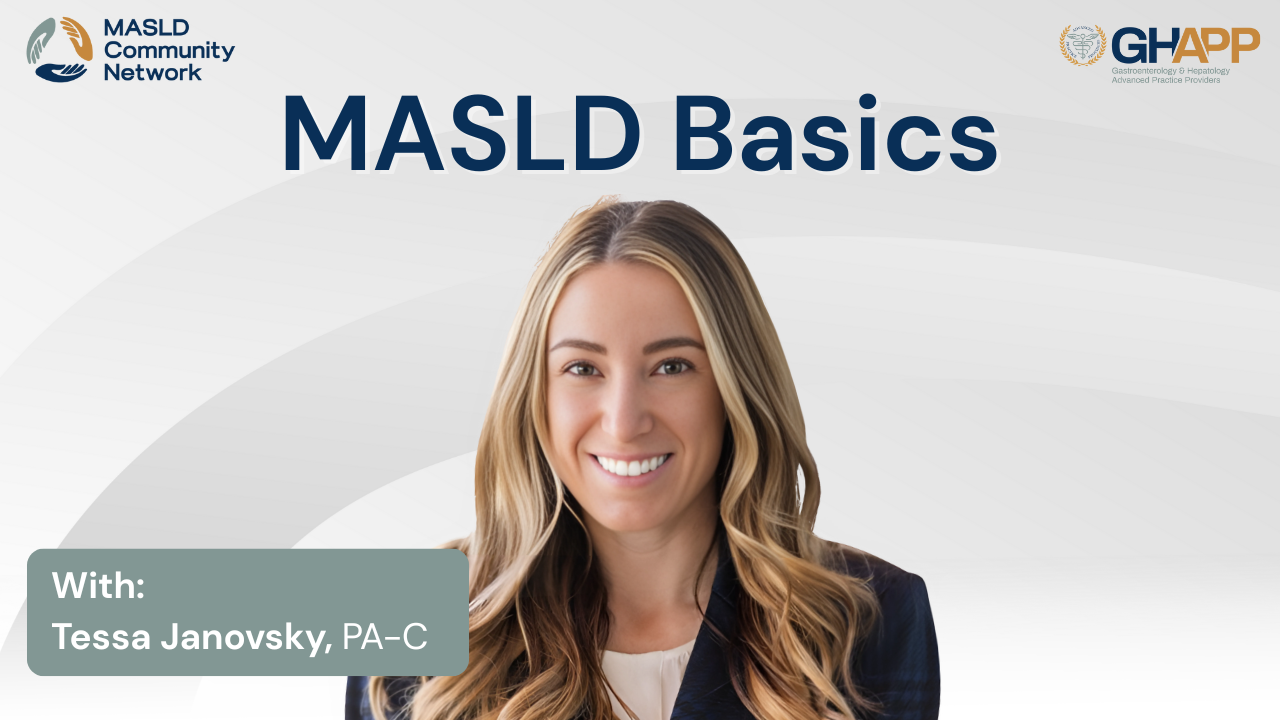
MASLD Basics With Tessa Janovsky

Join Tessa Janovsky, PA-C, from Arizona Liver Health, for this foundational session in the GHAPP MASLD Community Network, proudly sponsored by Madrigal Pharmaceuticals. This episode offers a comprehensive overview of the updated nomenclature and clinical approach to steatotic liver disease, covering the transition from NAFLD/NASH to MASLD (Metabolic Dysfunction-Associated Steatotic Liver Disease) and MASH (Metabolic Dysfunction-Associated Steatohepatitis). Tessa breaks down the rationale behind this global reclassification and explains how it improves diagnostic clarity while reducing stigma. You’ll learn how to identify MASLD using cardiometabolic risk factors, apply non-invasive risk stratification tools like FIB-4, FibroScan, and ELF, and determine when to refer patients for hepatology care. She also discusses the natural history of MASLD progression, the risk of cirrhosis and HCC, and the clinical importance of early detection and treatment. Real-world case studies guide providers through assessing common patient presentations, ruling out alternative etiologies, and considering pharmacologic therapy like resmetirom when appropriate. This is an essential watch for APPs, PCPs, and GI providers working to better understand and manage MASLD and MASH in clinical practice.
Watch Now

MASLD Basics With Valerie Shin

Join Valerie Shin, NP, from the Fatty Liver Institute at UCLA, for a foundational discussion in the GHAPP MASLD Community Network, sponsored by Madrigal Pharmaceuticals. This educational session covers the basics of steatotic liver disease (SLD), with a special focus on the evolving terminology and diagnostic criteria surrounding MASLD (Metabolic Dysfunction-Associated Steatotic Liver Disease) and MASH (Metabolic Steatohepatitis). Valerie explains why the shift away from the outdated “fatty liver” label is more than semantics—it removes stigma, increases diagnostic precision, and improves patient-provider communication. Through clear visuals and case-based discussion, this presentation outlines the global epidemiology of MASLD, how to classify disease etiology (MASLD, MetALD, ALD, or other rare causes), and how to risk-stratify patients using non-invasive tools like FIB-4, FibroScan, and ELF. Learn how to diagnose MASLD, when to refer to hepatology, how to use biomarkers for staging fibrosis, and when pharmacotherapy like resmetirom may be appropriate. With rising global prevalence and many patients progressing silently to cirrhosis or HCC, early detection and management are key. Don’t miss this practical, clinically grounded presentation designed for APPs and primary care providers managing patients with metabolic liver disease.
Watch Now

MASLD Basics With Scott Springer

Welcome to the GHAPP MASLD Community Network, where Scott Springer, PA-C, from Erie County Medical Center in Buffalo, NY, provides a comprehensive overview of the evolving landscape of steatotic liver disease. Sponsored by Madrigal Pharmaceuticals, this session breaks down the recent nomenclature shift from NAFLD/NASH to MASLD (Metabolic Dysfunction-Associated Steatotic Liver Disease) and MASH (Metabolic Dysfunction-Associated Steatohepatitis). Scott explores how overlapping etiologies like alcohol-associated liver disease (ALD) and the emerging classification of MetALD better reflect real-world patient populations. Learn about key diagnostic strategies—including the use of FIB-4, ELF score, and transient elastography—to assess fibrosis risk and guide referral to hepatology care. With a clinical case study, Scott highlights the importance of accurate staging, ruling out alternative etiologies, and understanding progression rates in high-risk patients. This session is a must-watch for GI and hepatology APPs looking to stay updated on guidelines, non-invasive diagnostics, and best practices for managing MASLD/MASH in primary and specialty settings.
Watch Now

MASLD Pharmacotherapy With Brian Lam

Join Brian Lam, PA-C, Associate Medical Director of Research at INOVA and Chair of the Global NASH/MASH Council, for an insightful discussion on pharmacotherapy for MASLD (Metabolic Dysfunction–Associated Steatotic Liver Disease), also known as fatty liver disease. This episode, part of the GHAPP MASLD Community Network, explores the evolution of treatment options—including GLP-1 receptor agonists like semaglutide and tirzepatide, the antioxidant benefits of vitamin E, the metabolic impact of pioglitazone, and the targeted liver-specific mechanism of action of Resmetirom (a THR-β agonist). Learn how weight loss remains a foundational strategy for MASH management, but with FDA approval of new agents like Resmetirom in March 2024, we now have more tools to address hepatic inflammation and fibrosis directly. Brian also shares practical considerations around comorbidities, cardiovascular risk, statin use, and how to evaluate appropriate patients using non-invasive testing like transient elastography and MR elastography. Whether you're new to managing fatty liver or an experienced hepatology APP, this overview provides the latest guidance and clinical insight to improve patient outcomes in MASLD and MASH care.
Watch Now
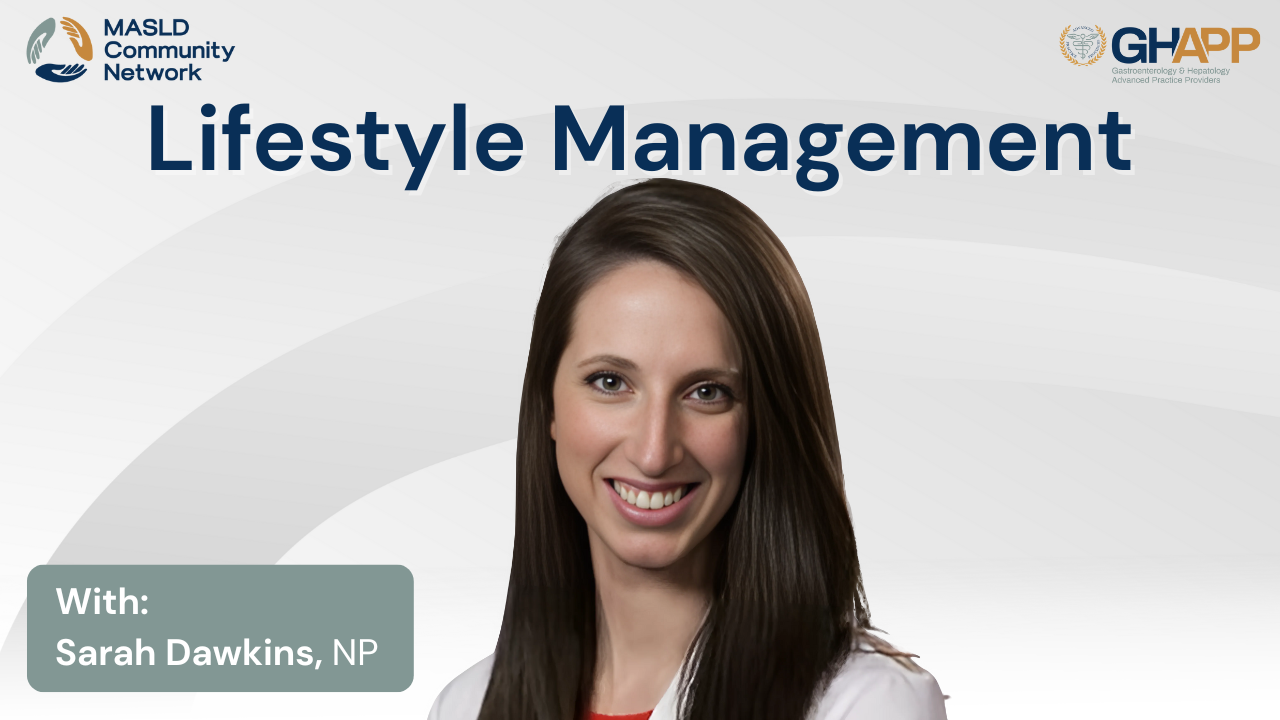
Lifestyle Management With Sarah Dawkins

Join Sarah Dawkins, NP, for an in-depth and inspiring conversation on lifestyle management for MASLD (Metabolic Dysfunction-Associated Steatotic Liver Disease) and MASH (Metabolic Dysfunction-Associated Steatohepatitis), presented through the GHAPP MASLD Community Network and sponsored by Madrigal Pharmaceuticals. In this engaging session, Sarah uses the real-world case of "Albert" to explore how to assess fibrosis risk using non-invasive testing like FIB-4 and FibroScan, and why lifestyle interventions remain the cornerstone of care for patients without advanced fibrosis. Through a patient-centered lens, she outlines practical strategies for addressing dietary counseling, exercise goals, and culturally sensitive approaches to nutrition—highlighting how individualized care, family involvement, and positive reinforcement can create meaningful behavior change. The session dives into the science behind genetic risk factors like PNPLA3, the role of central obesity in inflammation, and the impact of Western diets on liver health. Sarah also reviews the Mediterranean diet, exercise recommendations, and evidence-based interventions, including the benefits of aerobic + resistance training over HIIT for MASLD improvement. With clinical pearls on motivational interviewing, overcoming barriers to access, and the use of tools like the Exercise and Diet Adherence Scale (EDAS), this session empowers providers to make lifestyle conversations impactful—even when time is short.
Watch Now
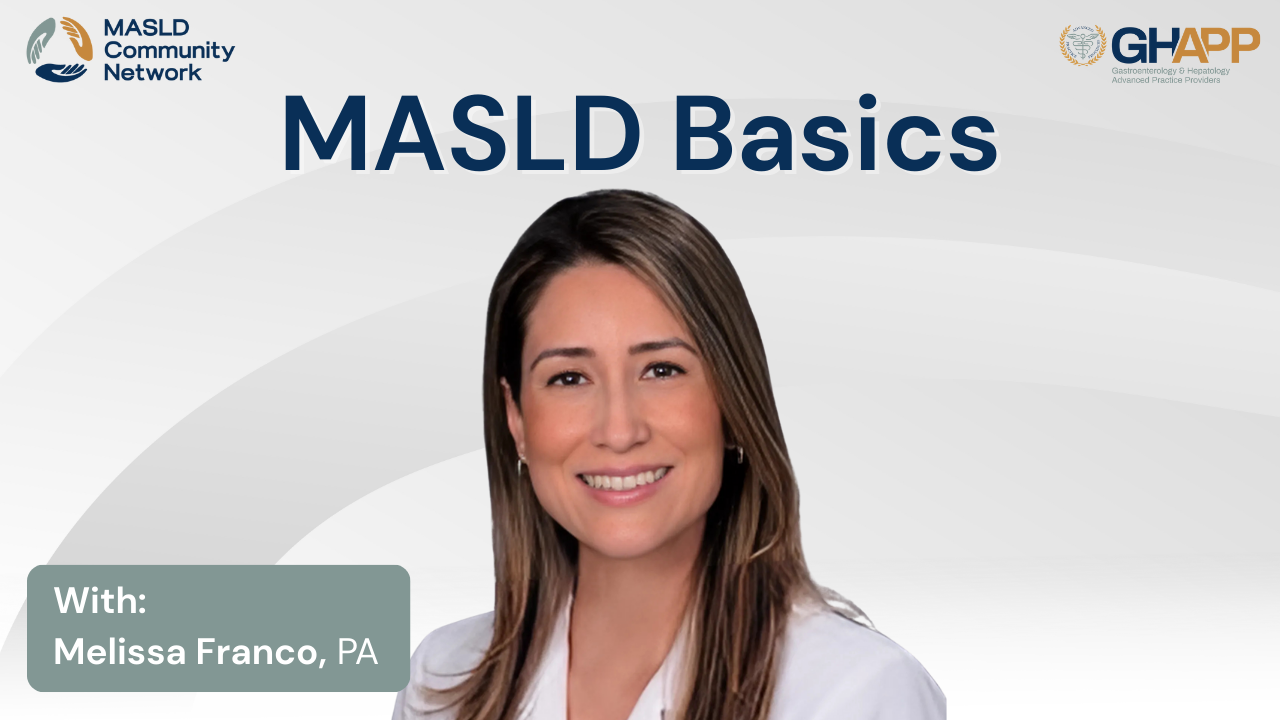
MASLD Basics With Melissa Franco

Join Melissa Franco, PA-C, from the University of Miami for a comprehensive review of MASLD (Metabolic Dysfunction-Associated Steatotic Liver Disease) and the 2023 nomenclature updates replacing NAFLD and NASH. Presented through the GHAPP MASLD Community Network and sponsored by Madrigal Pharmaceuticals, this session covers the spectrum of steatotic liver disease, including MASLD, MASH, MetALD, alcohol-related liver disease (ALD), and other causes of hepatic steatosis. Learn how to diagnose MASLD using imaging, cardiometabolic risk criteria, and how to exclude other causes like alcohol use, medications, and genetic disorders. Melissa explains how to risk stratify patients using FIB-4, FibroScan, and ELF testing, and when to consider referral to hepatology, especially for patients at intermediate or high risk for advanced fibrosis. The talk also explores global prevalence, natural history, disease progression to cirrhosis and HCC, and highlights the importance of identifying and managing patients with F2–F4 fibrosis, now classified as at-risk MASH. Through a real-world case study, viewers are guided on how to perform a thorough MASLD workup and assess patients for pharmacotherapy, lifestyle counseling, and surveillance protocols. Whether you are in primary care, GI, or endocrinology, this session is an essential resource for early diagnosis and comprehensive management of fatty liver disease in today’s clinical practice.
Watch Now

Lifestyle Management With Milly Ng

Join Milly Ng, NP, a hepatology nurse practitioner at Tufts Medical Center in Boston, for an evidence-based session on lifestyle management for MASLD and MASH, presented through the GHAPP MASLD Community Network and sponsored by Madrigal Pharmaceuticals. Through the case of "Albert," a patient with steatosis and metabolic risk factors, Milly highlights the importance of personalized counseling and non-invasive testing like FIB-4 and FibroScan to assess fibrosis risk. She reviews how Metabolic Dysfunction-Associated Steatotic Liver Disease (MASLD) and its progressive form, MASH, can be reversed through diet, exercise, and weight loss, particularly before fibrosis advances to cirrhosis. Learn how to tailor dietary guidance to a patient's cultural background, socioeconomic status, and personal goals, and understand how central obesity and insulin resistance drive disease progression. Milly also reviews the genetic and environmental factors influencing steatosis, why aerobic training may be more effective than resistance workouts for liver health, and how validated tools like the EDAS (Exercise and Diet Adherence Scale) can track patient progress. This session empowers primary care and hepatology providers to deliver patient-centered lifestyle interventions that can prevent liver disease progression and reduce cardiometabolic risk.
Watch Now
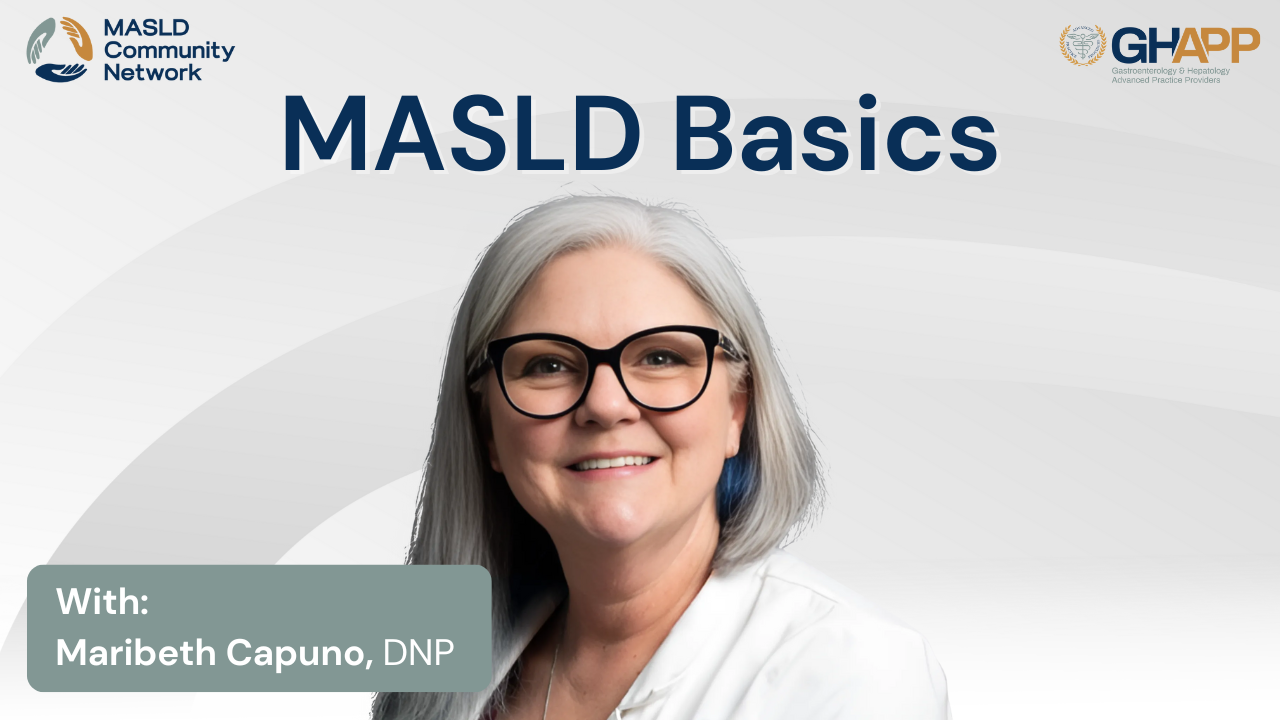
MASLD Basics With Maribeth Capuno

Join us for an in-depth overview of steatotic liver disease, presented through the GHAPP MASLD/MASH Community Network and proudly sponsored by Madrigal Pharmaceuticals. This engaging session walks through the updated terminology replacing NAFLD and NASH with MASLD (Metabolic Dysfunction-Associated Steatotic Liver Disease) and MASH (Metabolic Dysfunction-Associated Steatohepatitis)—explaining what the name change means and how to apply the latest AASLD 2023 guidelines in clinical practice. Learn how to identify MASLD based on cardiometabolic risk factors, rule out other causes of steatosis such as alcohol use, autoimmune conditions, and hereditary liver diseases, and determine when to use non-invasive testing like FIB-4, FibroScan, and ELF to stratify fibrosis risk. With Global Fatty Liver Day around the corner, this timely presentation also highlights the global burden of MASLD, its progression from steatosis to cirrhosis and HCC, and practical steps for primary care and hepatology teams to intervene early. You'll follow the case of JP, a 55-year-old with obesity, pre-diabetes, and elevated liver enzymes, as a real-world example of how to evaluate, diagnose, and manage MASLD—and when to refer to hepatology for advanced care. Whether you're a GI provider, APP, or primary care clinician, this talk offers a practical roadmap for managing fatty liver disease in 2025 and beyond.
Watch Now
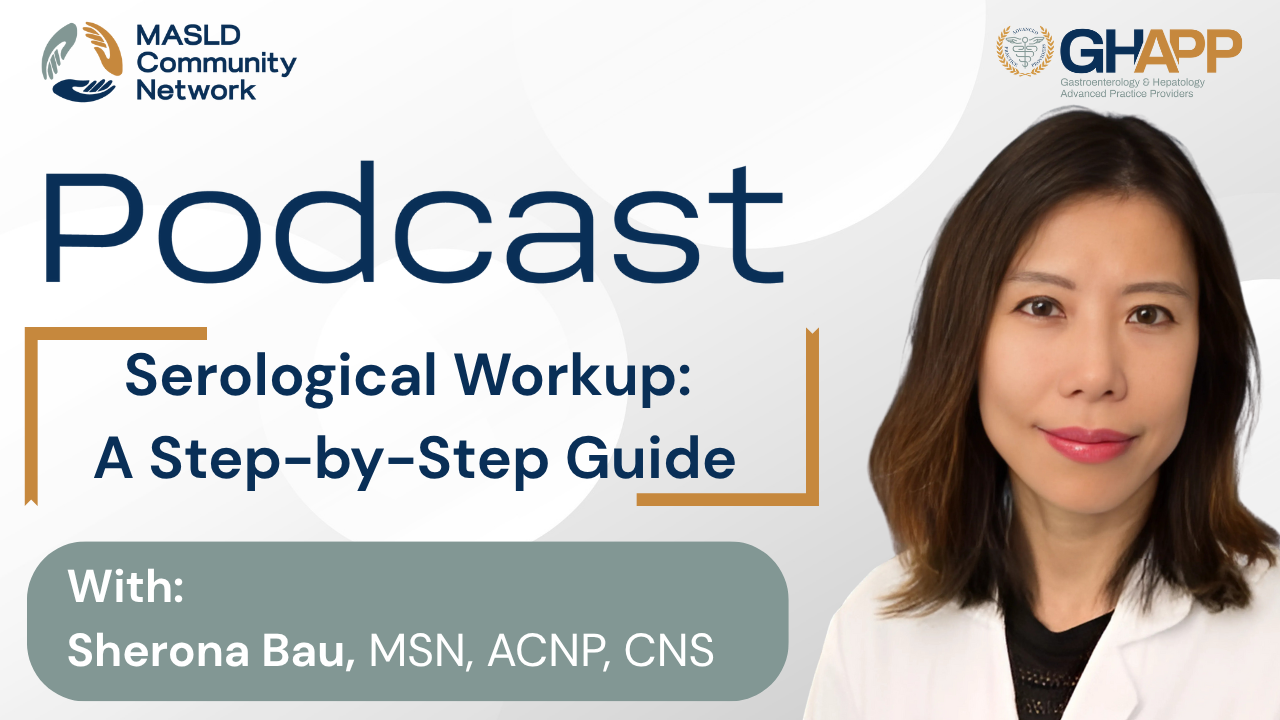
Serological Workup: A Step-by-Step Guide

In this comprehensive video, Sherona Bau, NP from UCLA, breaks down the essential hepatology workup for patients with MASLD (formerly NAFLD) and MASH, offering guidance for both primary care providers and GI/hepatology specialists. Drawing from her extensive clinical experience, she outlines a systematic approach to evaluating abnormal liver ultrasound findings—starting with critical labs to rule out chronic liver conditions like hepatitis B, hepatitis C, autoimmune hepatitis, PBC, and hereditary hemochromatosis. Sherona discusses the importance of ordering ANA, AMA, ferritin, serologies, and even specialized labs like the phosphatidylethanol (PEth) test to uncover alcohol-related liver disease that may be overlooked. She emphasizes the need to screen for cardiometabolic risk factors including type 2 diabetes and dyslipidemia and highlights non-invasive tests such as FibroScan and FIB-4 to help identify patients at risk of advanced fibrosis who may benefit from specialist referral. Most importantly, Sherona addresses the fears many patients face around liver disease progression and life expectancy, encouraging early intervention and coordinated care to improve long-term outcomes. This video is a must-watch for any clinician managing steatotic liver disease.
Watch Now
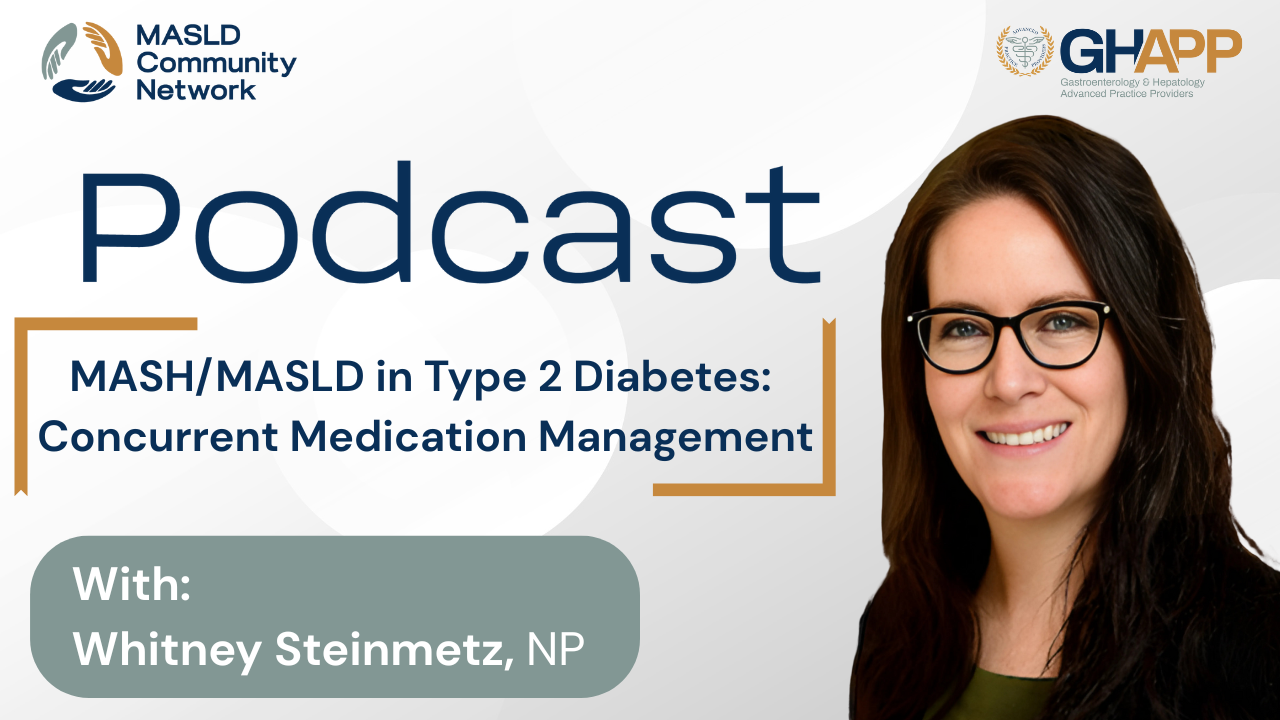
MASH/MASLD in Type 2 Diabetes: Concurrent Medication Management

In this informative episode, Whitney Steinmetz, NP from Presbyterian Medical Group in Albuquerque, NM, explores how to optimize medication strategies for patients with type 2 diabetes who are also living with MASLD and MASH. She discusses why individuals with type 2 diabetes are at significantly higher risk for developing advanced liver fibrosis—highlighting the overlapping metabolic, inflammatory, and insulin-resistant pathways that accelerate liver damage. Whitney breaks down how commonly prescribed diabetes medications—like GLP-1 receptor agonists, SGLT2 inhibitors, TZDs, and dual/triple incretins—impact liver fat, inflammation, and fibrosis progression. She offers practical guidance on selecting therapies that balance glycemic control with hepatic benefits while minimizing polypharmacy. Learn which medications may offer dual cardiometabolic and hepatic advantages, and which should be avoided or used with caution in patients with cirrhosis or advanced fibrosis. Tune in for real-world insights into how advanced practice providers can take ownership of MASH management in diabetes care.
Watch Now
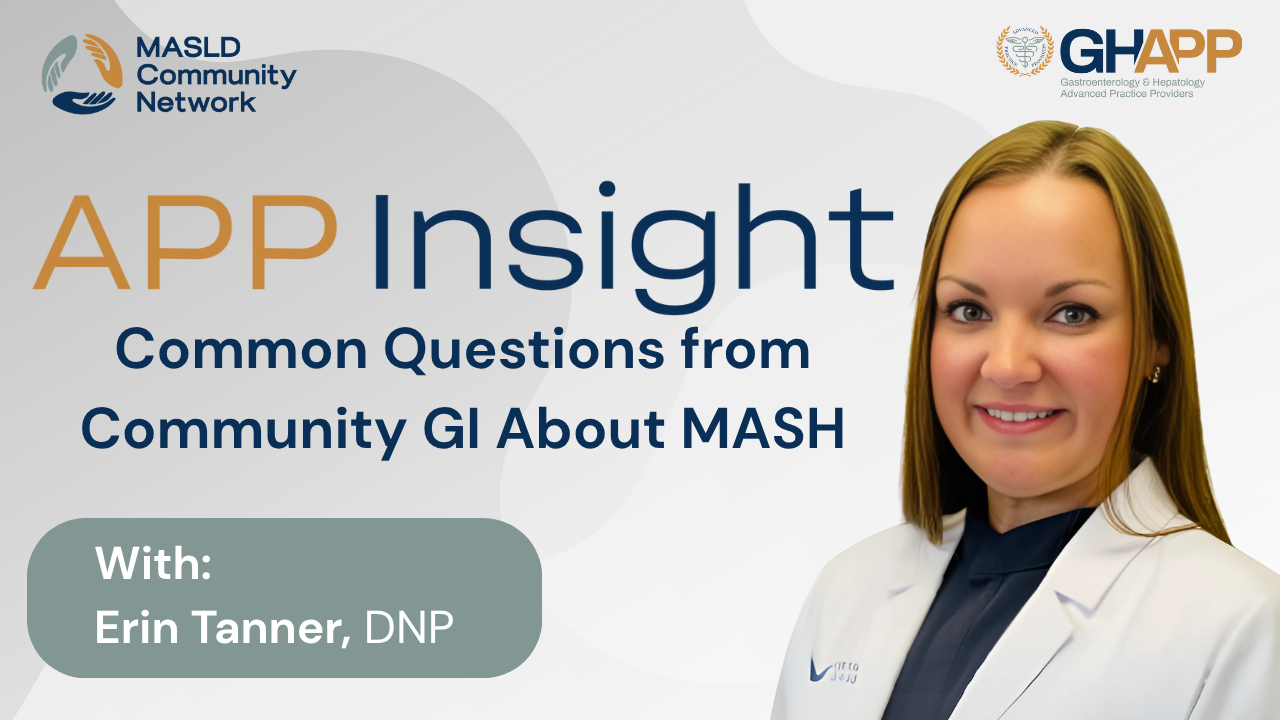
Common Questions from Community GI About MASH

In this practical and timely video, Erin Tanner, NP at Gastro Health in Birmingham, Alabama, shares expert insights on how community gastroenterology providers should approach incidental findings of fatty liver (MASLD/MASH) on abdominal imaging. With over 14 years of experience in GI and hepatology, Erin emphasizes that fatty liver can no longer be ignored, even when discovered during workups for unrelated GI symptoms like reflux or diarrhea. She walks through the step-by-step use of the FIB-4 index to risk-stratify patients and explains when to follow up with further non-invasive testing such as FibroScan® or ultrasound elastography. For patients with F3 fibrosis, Erin outlines next steps including lifestyle interventions, the use of Resmetirom, and the promise of GLP-1 therapies for future treatment. This is a must-watch for GI clinicians aiming to improve outcomes by proactively managing fatty liver disease in everyday practice.
Watch Now
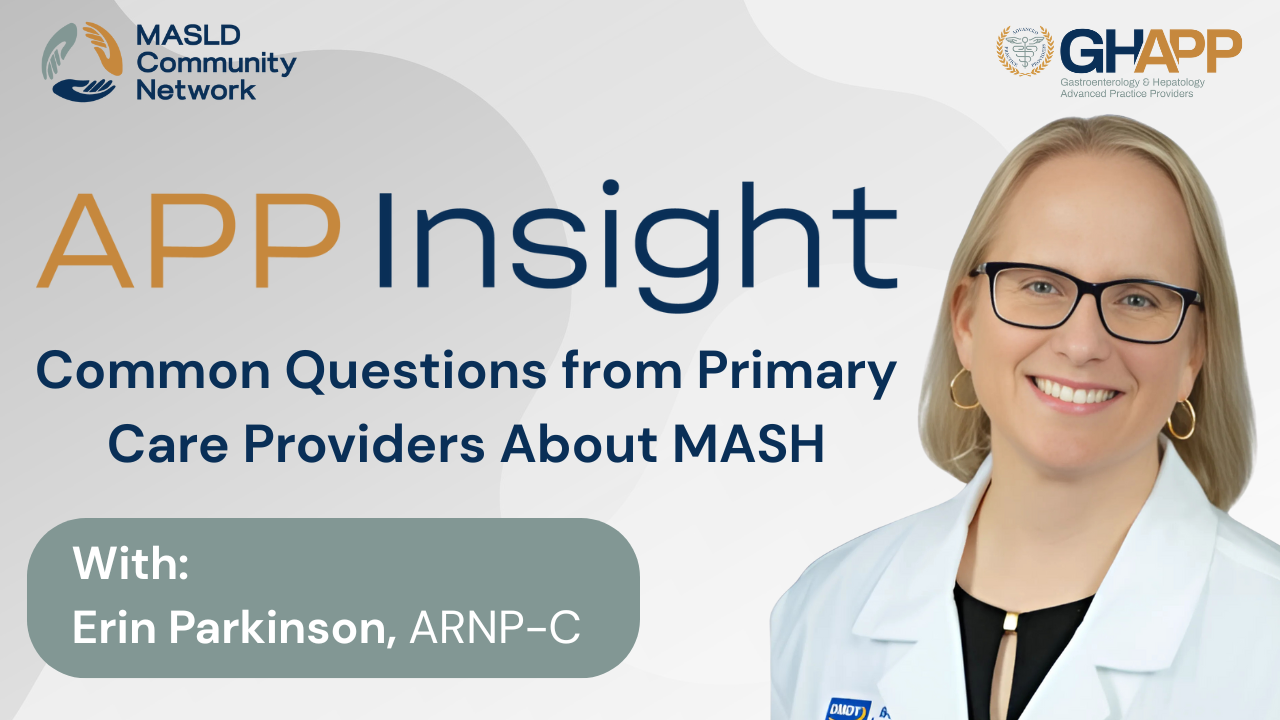
Common Questions from Primary Care Providers About MASH

In this educational video, Erin Parkinson, ARNP-C at the Transplant Institute at Tampa General Medical Group, addresses two of the most frequently asked questions from primary care providers about MASLD (Metabolic dysfunction-associated steatotic liver disease) and MASH (Metabolic-associated steatohepatitis). First, she explains when it’s appropriate to refer a patient to GI or hepatology, emphasizing the use of FIB-4 for risk stratification and recommending referral when scores are indeterminate or high, especially if a FibroScan® result shows ≥8 kPa. Erin also discusses lifestyle interventions, reinforcing the importance of weight loss and dietary modification, with strong endorsement of the Mediterranean diet—a recommendation supported by major liver societies. She also notes that intermittent fasting may be a helpful adjunct for patients seeking to improve liver health through sustainable weight reduction. This video provides practical tools for frontline providers to improve early detection and management of fatty liver disease.
Watch Now

MASH Bootcamp Q&A

In this interactive Q&A session, a panel of liver disease experts discusses key challenges in diagnosing and treating metabolic dysfunction-associated steatohepatitis (MASH) using non-invasive testing and the latest therapeutic advancements. The panel explores the role of FibroScan, ELF scores, and cardiometabolic risk factors in diagnosing fibrosis, especially in patients with limited access to MRI or VCTE-based assessments. They also discuss how serologic testing can be a viable alternative in resource-limited settings and when a liver biopsy may not be necessary for diagnosis. The discussion highlights the FDA approval criteria for Resmetirom, its limitations in F4 patients, and practical strategies for determining treatment eligibility. The experts address real-world challenges, including diagnosing MASH in rural areas, evaluating confounding factors in fibrosis assessment, and ensuring comprehensive liver disease workups to rule out autoimmune conditions.
Watch Now




